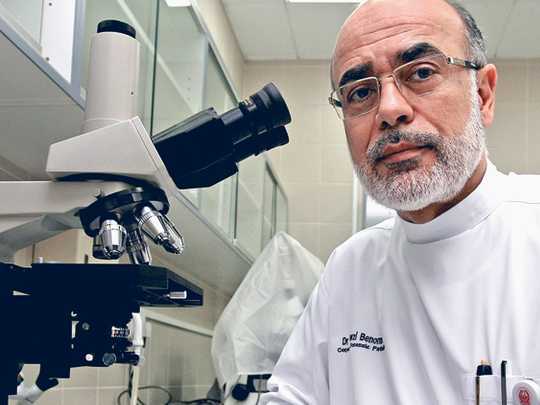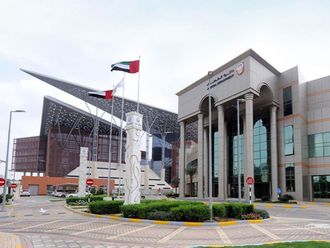
Dubai: For over a decade, he has been developing the Forensic Medicine at Dubai Police to make it one of the leading departments in achieving major breakthroughs in criminal cases.
He is currently working to expand the scope of its human resources to include Emiratis experts in the crucial field of forensic medicine.
Gulf News interviewed Professor Fawzi Bin Omran, Director of Forensic Medicine in the General Department of Forensic Sciences of Dubai Police. Professor Bin Omran is also the professor of forensic medicine at Dubai Medical College and professor of forensic medicine at the Dubai Police Academy.
Gulf news: Please introduce us to the forensic medicine department and the different sections and roles of each division?
Professor Bin Omran: The Department of Forensic Medicine is one of the departments of the General Department of Forensic Sciences. Experts in this department are medical doctors with special training in the field of forensic medicine and pathology.
There are three sections in the department: Clinical Forensic Medicine Section, which deals with examining live victims of injuries, victims and associates of sexual crimes, age assessment in civil and criminal circumstances and plaintiffs in medical negligence cases.
The Forensic Pathology Section, which deals with receiving, postmortem examination, safe-keeping of corpses and proper delivery of bodies to their relatives for burial. Most deaths received by the department are due to natural causes.
Finally, the Technical Diagnostic Support Section, includes histopathology laboratory, X-ray and digital photography. The department produces medico-legal reports about the cases, which are considered as evidence in the courts of law.
Did you come across incidents where many years later a family member claimed the body of an unidentified person? Please provide an example, if present.
A human skeleton was found in the desert and was identified by comparing its DNA with missing persons. It was then handed over to relatives. That person had been reported missing for about 10 years.
How many corpses can the department's morgue accommodate and how many are there at the moment?
I would like to plead with the general public, companies and consulates of different embassies to claim any deceased they know as soon as possible.
We realise there is a multinational population in Dubai, which means different methods of body disposal after death and many residents like to repatriate the dead which probably is a cause for the delay in certain cases.
The full capacity of our cold rooms is 120 bodies, and this we intended as contingency plan for mass disasters.
Normally, we receive about five bodies daily, but because of the delay in claiming them they accumulate gradually, so there are always 35 to 45 bodies.
How long does a corpse stay in the morgue in case no one claims the body? Is there a time limit and in case no one claims the body what is the procedure the department undertakes?
Only the Attorney General has the power to dispose of the unidentified bodies. The time limit is at his discretion, but we keep continuous contact through proper channels to help that process.
When a decision is made to dispose an unidentified body, we keep a blood sample in case a relative shows up in the future. Of course, we try to identify unknown bodies with all possible medical and non-medical procedures including publishing their pictures in newspapers and other media.
The media extensively highlighted the case of the two French children who died of suspected food poisoning. What is your view on the case, the autopsy and tests carried to determine the cause of death? What is in your opinion on the cause of their death?
It is very difficult to ascertain or confirm that a certain death was due to food poisoning. Usually circumstantial evidence is used to reach a diagnosis. Bacterial poisons, that kill victims of food poisoning, are biological material and become degraded after death. It is very essential in those cases to take samples as soon as possible to be sent to a specialised bacteriology laboratory.
Investigation of food poisoning is not a matter for forensic medicine, but therapeutic medicine, because the aim is to treat those cases. The duty of the forensic medical expert is simply to take samples and send them to the hospital laboratory.
What are the most important cases you have worked on since you joined Dubai Police?
This is a difficult question. Cases that I find important might be thought of by the public as ordinary, but the reverse is true. The general public and news reporters look for cases that make the news. Sometimes, a very difficult and interesting case from our point of view would not be newsworthy.
The murder of Suzanne Tamim, for example, was very straightforward from the forensic medicine point of view, but everybody is interested in it and asks us about it. It gained publicity because the victim was famous, and because of the ingenious way by which the Criminal Investigation Department identified the perpetrator.
On the other hand, we had several cases that we consider of particular importance but nobody was interested in them.
One of them was of a man who committed suicide by hanging and the relatives cut him down and called the ambulance but told the crew that he died in his sleep. They knew that suicide was not covered by the deceased's insurance policy.
The crew bought the story and transferred the body to the hospital. When we examined the body we knew that he died of hanging, and gave a report to that effect, and consequently the relatives confessed.
Another case was when it appeared that a woman died in her sleep, but an autopsy revealed that she was suffocated with a pillow. The police identified the assailant by his fingerprints and he was captured.
Is there enough importance and research given to this field in the Arab world and in particular in the UAE?
Forensic medicine continues to be the most important branch which initiates, leads and concludes the whole process of scientific investigation.
On the personal level, I have published three books, and more than 20 articles in referenced international scientific journals in forensic medicine. I have also published general literary articles in several journals in the UAE and Libya. I have been selected as a referee to the Journal of Legal and Forensic Medicine by Elsevier publishers. I have contributed with lectures and scientific papers to more than 30 international conferences.
How many cases did the department examine including major breakthroughs?
During the last decade, our annual average totalled 3,242 cases including deaths from all causes, live cases referred to assess injuries and disability, live cases of sexual crimes and other miscellaneous cases where a medical opinion is required by the courts of law.
The average number of deaths examined yearly has been 1,124 cases, which constituted 35 per cent of all our cases, most of them were deaths due to natural causes referred to us because it had been impossible to obtain a medical certificate of cause of death from the attending physician.
Of the total deaths, the yearly average homicides were 27 cases only, which constituted 2.4 per cent of all deaths. If the 27 homicides were calculated as an average of all deaths that occur in Dubai, including hospital deaths which were not referred to us, the percentage will be even smaller. This reflects a very low homicide rate in the country.
Skills: Expanding expertise
Professor Fawzi Bin Omran, Director of Forensic Medicine in the General Department of Forensic Sciences of Dubai Police, said there are projects to further develop the field of forensic medicine at Dubai Police. "One of the projects that I initiated was to recruit Emirati doctors and train them. At the moment, all actively working forensic medical examiners in Dubai are expatriates," he said
He said most of the work requires dedication of time as well as perseverance and added that this will only be possible through Emiratis working on a permanent basis. Bin Omran added: "That was the reason behind my initiative to recruit Emirati doctors and encourage them to go for postgraduate studies and training in international centres with a good reputation in the field."
He said they have already recruited four Emirati doctors, two men and two women. He said three are in Germany training for a certificate of experience. Bin Omran said his team is trying to convince a woman doctor who has joined them to pursue a doctorate in the UK. "I am sure that when these graduates come back they will be in a better position to further develop the forensic scene in Dubai," he added.












